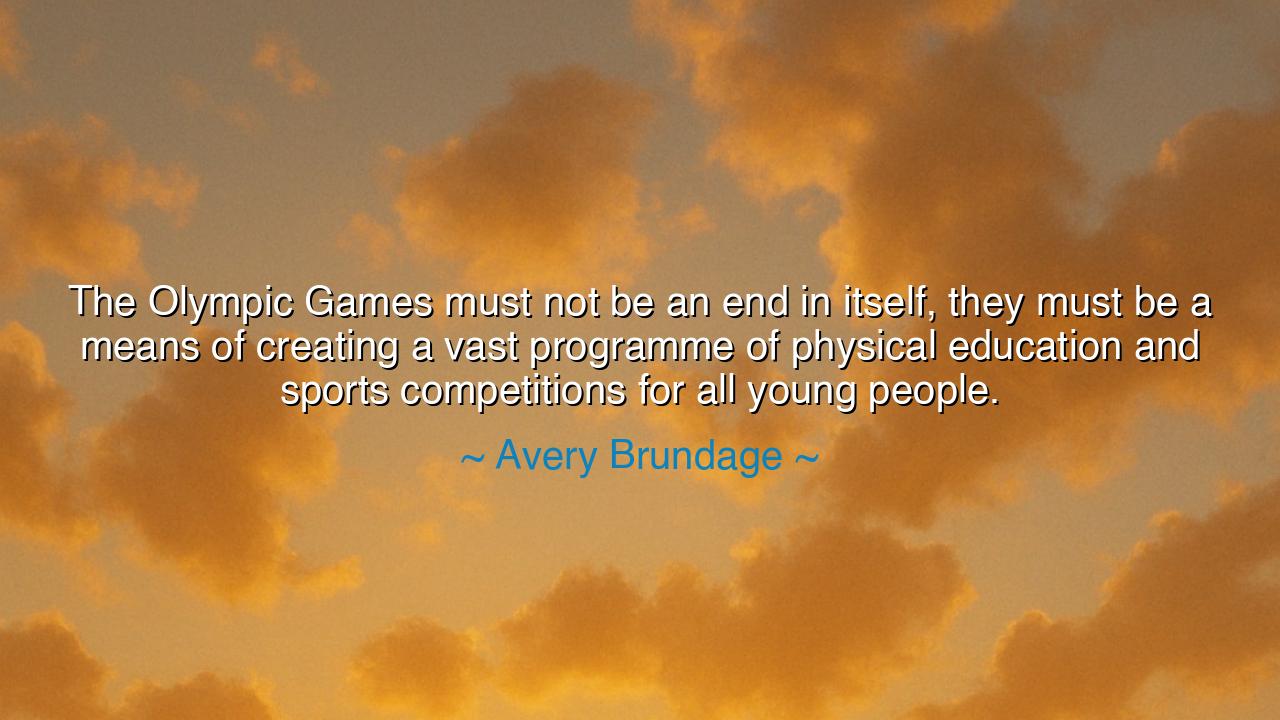
The Olympic Games must not be an end in itself, they must be a
The Olympic Games must not be an end in itself, they must be a means of creating a vast programme of physical education and sports competitions for all young people.






Hear the commanding words of Avery Brundage, guardian of the Olympic spirit, who declared: “The Olympic Games must not be an end in itself, they must be a means of creating a vast programme of physical education and sports competitions for all young people.” At first, these words seem like counsel to administrators and coaches, but in truth they resound as a call to humanity itself. For the Olympic Games, with all their splendor and glory, are not merely festivals of competition, but torches meant to ignite the hearts of youth everywhere, teaching discipline, courage, and fellowship.
The meaning of this saying lies in the distinction between spectacle and purpose. To view the Olympics merely as a final stage, a contest of the best against the best, is to miss their higher mission. Brundage insists that the Games are not an end in itself, but a beacon, meant to inspire nations to invest in physical education and the cultivation of sport for all, especially the young. For the true victory of the Games is not a medal draped on one champion, but the countless boys and girls who learn through sport to strengthen their bodies, discipline their wills, and ennoble their characters.
The origin of this wisdom reaches back to the ancient Greeks. The Olympic festival at Olympia was not only for the few who competed; it was a cultural celebration that lifted the entire Hellenic world. Through poetry, sculpture, and the very presence of athletes, the Games reminded all of Greece that physical excellence was a pillar of human flourishing. It was understood that the glory of one athlete was but a spark; the true fire was in the example, kindling strength and harmony in the many. Brundage’s words are a modern echo of this same philosophy.
Consider the story of Japan after World War II. The nation, humbled and broken, sought renewal not only through industry and rebuilding, but through the hosting of the 1964 Tokyo Olympics. These Games were not merely about showcasing champions; they were about inspiring an entire generation of Japanese youth to reclaim strength, unity, and pride through sport. Gymnasiums and programs spread across the nation, and the spirit of physical education flourished. This is precisely the vision Brundage spoke of: that the Games should awaken societies to invest in the vitality of their young.
The lesson is clear: glory fades quickly when reserved only for the few, but when shared among the many, it becomes enduring strength. If the Olympic Games are to matter, they must not only exalt the champion but uplift the child, the student, the apprentice. For it is not enough to watch greatness; each generation must be given the chance to practice it, to sweat, to stumble, to grow stronger through their own contests. This is how societies cultivate not only athletes, but citizens of character.
Practical actions must follow. Let schools invest in physical education as much as in mathematics or literature, for the training of the body supports the training of the mind. Let communities create spaces for play, competition, and healthy striving. Let parents and mentors encourage the young not only to watch the Olympics but to move, to run, to wrestle, to swim. For every hour of training sows seeds of discipline, resilience, and confidence that last far beyond the field.
And so, child of tomorrow, heed the wisdom of Avery Brundage. The Olympic Games are not merely medals and ceremonies, but a symbol—a torch meant to pass from the stadium into every home, every school, every community. Do not let them be an end, a spectacle to be consumed and forgotten. Let them be the spark of a fire that burns in the hearts of the young, a fire that lights the path to strength, to unity, and to human excellence. For when sport lives in the many, not only in the few, then the Games fulfill their highest destiny.






AAdministratorAdministrator
Welcome, honored guests. Please leave a comment, we will respond soon